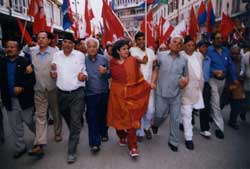 From our collective scowls and snarls, it looks like the national blame game is going to continue for a while. There's one question we can no longer avoid. If each one of us is so convinced that everybody else is censurable for our plight, why is it taking so long to find a way to set things right? Probably because we're using too many hard words for soft arguments.
From our collective scowls and snarls, it looks like the national blame game is going to continue for a while. There's one question we can no longer avoid. If each one of us is so convinced that everybody else is censurable for our plight, why is it taking so long to find a way to set things right? Probably because we're using too many hard words for soft arguments. Take the post-October Fourth clamour. In King Gyanendra's text, justifying the dismissal of Sher Bahadur Deuba, the word "incompetence" appears twice. Both times it strictly refers to the premier's failure to conduct the general elections on the stipulated date in accordance with the constitution. In the five days it took our mainstream politicians to begin grasping the significance of the royal step, the relevance of that core reality receded. We started seeing Deuba's second innings as an emblem of ineptitude in its entirety.
There were some vital questions that should have been asked right then. Could a premier who could seal a ceasefire with the Maoists even before he formally stepped into Singha Darbar really be such a loser? Sure, Deuba bungled the peace talks. Doesn't the sense of betrayal he consistently exhibited over the next 10 months say something even if it was half real?
What led our comrades who blocked an entire session of parliament to oust Deuba's predecessor take out a rally across Kathmandu in support of the new premier's agenda? Something much more than unmitigated relief must have gone into it. Remember what Deuba was doing when the all-party allies thundered from the Tundikhel open theatre around this time last year? Surreptitiously scheming to subvert a genuine effort to resolve the insurgency, as Girija Prasad Koirala recently suggested? Maybe. In full public view, Deuba had just fastened himself to the Bush/Blair bloc in a move the Maoists acknowledge eventually forced them to return to the negotiating table. Maybe the Belgian prime minister thinks he owes the survival of his coalition partly to his Nepali counterpart who encamped himself in Brussels to show MPs there how badly we needed those 5,500 machine guns. There still aren't easy answers now, but we should have asked those questions then.
The sweeping "incompetent" tag stuck because it served the purpose of the other seven men who signed the poll-postponement plea the premier took to the palace. Deuba's insistence that he could still hold the elections and that he signed that paper only as an overture to the other signatories hardly matters today. Regardless of its constitutionality, the restoration of Deuba's government as a rectification of the palace's protrusion remains politically inexpedient. Deuba, too, pretends the royal indictment pertains to his entire tenure. That's probably because it's the only way he can hope to play up an overnight transformation from a Tulsi Giri to a BP Koirala.
Now that King Gyanendra's clarification has put matters in perspective, we might as well probe the linguistic intricacies that afflict the peace process. Before you wonder how the Maoists, who were all out for institutionalising our embryonic republic until October Fourth, could contemplate talking to an all-powerful palace, consider the following. An embryo is liable to a miscarriage, capable of being aborted and runs the risk of stillbirth. The Maoists have made up their mind and, at this point, it no longer matters what actually happened to that clump of cells.
Puzzled why the army is becoming politically explicit in its pronouncements these days? Ask the generals how they feel every time they hear politicos drop 'Nepali' and perpetuate the incompleteness of the Shahi Sena debate. Obviously, Kangresis and comrades couldn't have pursued their campaign to bring under civilian control a force that already has a clear popular connotation in its formal name. But, then, politicians can't be generals. Matrika Prasad Koirala hardly used the honourary military title he received. (The only truly civilian martial-law administrator I can recall is Pakistan's Zulfiqar Ali Bhutto and look what happened to him.)
The army's admission that it has barely recovered 15 percent of the arms looted by the Maoists may reflect poorly on its search-and-recover prowess. Look at the other side of the assertion: 85 percent of the job remains to be done. Translation: the Maoists should either help out soon or prepare for the long haul without that five-kilometre perimeter. The next time Baburam Bhattarai asks us to consider the "ground realities", let's be sure to look beyond the mud slinging to make sense of the shifting sands.


